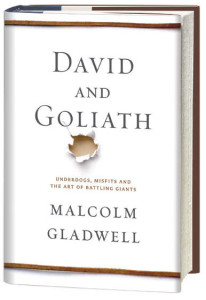“The idea of desirable difficulty suggests that not all difficulties are negative.” David and Goliath by Malcolm Gladwell
As a leader, it is extremely important to step back and look at a situation from a different perspective. Sometimes you have to step back from the trees in order to see the forest. David and Goliath is a great opportunity to do just that…to think about things differently. Malcolm Gladwell has written several books and articles over the past few years that have challenged normal paradigms and encouraged innovative thinking…and he’s definitely done it again! Using a great mix of historical storytelling, referencing Scripture, and integrating politics, geography, literature, and much, much, more, this book reads like an adventure, a conversation, and a disagreement all at the same time. When you reach the end of this book, you will definitely feel enriched and ready to tackle new challenges.
I highlighted several passages while reading and have posted them below…
- But the Lord said to Samuel, “Do not look on his appearance or on the height of his stature, because I have rejected him; for the Lord does not see as mortals see; they look on the outward appearance, but the Lord looks on the heart.” 1 Samuel 16:7
- Through these stories, I want to explore two ideas. The first is that much of what we consider valuable in our world arises out of these kinds of lopsided conflicts, because the act of facing overwhelming odds produces greatness and beauty. And second, that we consistently get these kinds of conflicts wrong.
- Some pretend to be rich, yet have nothing; others pretend to be poor, yet have great wealth. Proverbs 13:7
- We spend a lot of time thinking about the ways that prestige and resources and belonging to elite institutions make us better off. We don’t spend enough time thinking about the ways in which those kinds of material advantages limit our options.
- More is not always better.
- Our sense of how deprived we are is relative.
- Conventional wisdom holds that a disadvantage is something that ought to be avoided—that it is a setback or a difficulty that leaves you worse off than you would be otherwise. But that is not always the case.
- Most of the learning that we do is capitalization learning. It is easy and obvious.
- Innovators have to be open. They have to be able to imagine things that others cannot and to be willing to challenge their own preconceptions. They also need to be conscientious. An innovator who has brilliant ideas but lacks the discipline and persistence to carry them out is merely a dreamer. That, too, is obvious.
- A radical and transformative thought goes nowhere without the willingness to challenge convention.
- The idea of desirable difficulty suggests that not all difficulties are negative.
- “We are all of us not merely liable to fear, we are also prone to be afraid of being afraid, and the conquering of fear produces exhilaration…When we have been afraid that we may panic in an air-raid, and, when it happened, we have exhibited to others nothing but a calm exterior and we are now safe, the contrast between the previous apprehension and the present relief and feeling of security promotes a self-confidence that is the very father and mother of courage.” MacCurdy writing on the experience of being in the London Blitz
- “I returned, and saw under the sun, that the race is not to the swift, nor the battle to the strong, neither yet bread to the wise, nor yet riches to men of understanding, nor yet favor to men of skill; but time and chance happeneth to them all.” Ecclesiastes 9:11
- Fundamental to our analysis is the assumption that the population, as individuals or groups, behaves “rationally,” that it calculates costs and benefits to the extent that they can be related to different courses of action, and makes choices accordingly.
